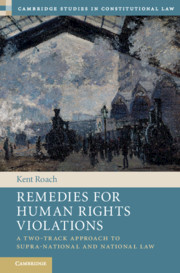Book contents
- Remedies for Human Rights Violations
- Cambridge Studies in Constitutional Law
- Remedies for Human Rights Violations
- Copyright page
- Brief Contents
- Contents
- Acknowledgements
- Table of Cases
- 1 The Importance and Complexity of Remedies
- 2 A Two-Track Approach to Individual and Systemic Remedies
- 3 Interim Remedies
- 4 Remedies for Laws That Violate Human Rights
- 5 Damages
- 6 Remedies in the Criminal Process
- 7 Declarations, Injunctions and the Declaration Plus
- 8 Remedies for Social, Economic and Cultural Rights
- 9 Remedies for Violations of Indigenous Rights
- 10 Conclusion
- Select Bibliography
- Index
1 - The Importance and Complexity of Remedies
Published online by Cambridge University Press: 29 March 2021
- Remedies for Human Rights Violations
- Cambridge Studies in Constitutional Law
- Remedies for Human Rights Violations
- Copyright page
- Brief Contents
- Contents
- Acknowledgements
- Table of Cases
- 1 The Importance and Complexity of Remedies
- 2 A Two-Track Approach to Individual and Systemic Remedies
- 3 Interim Remedies
- 4 Remedies for Laws That Violate Human Rights
- 5 Damages
- 6 Remedies in the Criminal Process
- 7 Declarations, Injunctions and the Declaration Plus
- 8 Remedies for Social, Economic and Cultural Rights
- 9 Remedies for Violations of Indigenous Rights
- 10 Conclusion
- Select Bibliography
- Index
Summary
Part I examines common issues in remedies including their dual compensatory and preventive goals pursued through the two-track approach. Part II discusses the legal process and dialogic methodology used throughout the book. With reference to scholarship by Edwin Borchard and Abram Chayes, Part III justifies the decision to examine remedies in both supra-national and national human rights. Part IV examines the relation between rights and remedies including remedial deterrence where judges do not find violations because of concerns about excessive remedies. Part V examines textual sources for remedies in international and select domestic human rights contexts. It concludes that while some texts such as the European Convention on Human Rights may restrict some remedies, vague admonitions for the need for effective and appropriate remedies do not assist remedial decision-making. Distinctions between strong and rule-based exercises of remedial discretion are examined in Part VI where a principled approach is defended. The ability of proportionality principles to make remedial decision-making more disciplined and transparent is discussed in Part VII. The remedial principles of respecting subsidiarity in international law and the separation of powers are examined in Part VIII with an emphasis on the flexible and dialogic nature of these principles.
Keywords
- Type
- Chapter
- Information
- Remedies for Human Rights ViolationsA Two-Track Approach to Supra-national and National Law, pp. 1 - 72Publisher: Cambridge University PressPrint publication year: 2021

